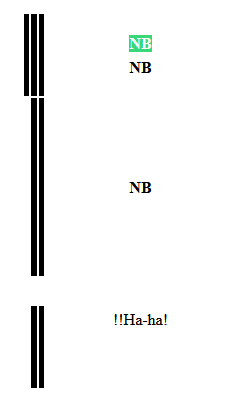For many years, I’ve considered myself a fan of Emil Cioran. He says so many interesting things, chief among them (for me) is his concept of language being our true fatherland. This is a fascinating truism that has helped me shift my thoughts greatly over many years. I have overcome many internal definitions because of Cioran’s advice.
Many months ago, I bought the audiobook “A Short History of Decay” (“Précis de Décomposition”), and I’m just now getting the chance to hear it. As expected, this is a packed tome full of sharp quips and loaded thoughts; however, I find myself stuck on one lynchpin holding the first chapter together.
Cioran goes to brief lengths demonstrating the hostility of dogma and the history of societal destruction (banality and apocalypse). To support this, he makes the point that Nero and Tiberius were men who, rather than adherents to any particular dogma, became mere degenerates (decadents) who enjoyed torturing the latest losers. Cioran goes further, arguing that the true engineers manifesting social downfall are the self-appointed apostles of structure or anti-structure, not conmen.
That’s… a tough concept for me. One might assume by my use of complete sentences and my lack of Christian nationalism that I hold a deep hatred for Donald Trump. One would be correct in that assumption. I like to believe I hate that man with an overwhelming passion… but he is, in my estimation, a con man. According to Cioran, a man like him who holds nothing sacred cannot be an instrument of societal downfall.
Here’s a quote:
 This leaves me with an apparent crossroads. Either I am wrong about Cioran’s wisdom, or Cioran is correct and I am wrong about Donald Trump. Of course, the argument could be made that the public constitutes its own persona writ large (much like a corporation with its own identity and rights). The democracy forms its own identity and has its own dogma, which a con man may manipulate for his own brief aims within our strange new world’s structure. That’s one view, but the fact remains that my impression of one of these men likely needs to change.
This leaves me with an apparent crossroads. Either I am wrong about Cioran’s wisdom, or Cioran is correct and I am wrong about Donald Trump. Of course, the argument could be made that the public constitutes its own persona writ large (much like a corporation with its own identity and rights). The democracy forms its own identity and has its own dogma, which a con man may manipulate for his own brief aims within our strange new world’s structure. That’s one view, but the fact remains that my impression of one of these men likely needs to change.
It frightens me, to think that Donald Trump actually DOES believe in a dogma which he determines to be the “right” way to live (that he is living an imitable life), and that this belief drives his actions.
RESPONSE
Cioran is a hard thinker to carry forward without friction, because his sharpness cuts in all directions, even (and especially) toward the people who admire him.
Let’s walk through this.
⚔️Cioran’s View on Dogma vs. Degeneracy
Cioran’s claim—roughly—that the con man, the decadent, the opportunist like Nero or Tiberius is not the true source of catastrophe, while dogmatic apostles of structure or anti-structure are, is a provocative way to separate evil born of belief from evil born of self-interest.
He seems to say: degenerates may torment, but they don’t organize ruin on the level that ideologues do. Ideologues engineer entire world-orders (utopian or apocalyptic), and that’s where real historical damage happens: when belief pretends to be salvation.
So to Cioran, Torquemada is more dangerous than Caligula.
 (above) Juan de Torquemada of the Spanish Inquisition
(above) Juan de Torquemada of the Spanish Inquisition
 (above) Gaius Caesar Augustus Germanicus a.k.a. Caligula
(above) Gaius Caesar Augustus Germanicus a.k.a. Caligula
🐍 So… Where Does Trump Fall?
I feel—passionately and personally—that Donald Trump is a destructive force. I see him not just as a vulgar opportunist, but as a real danger to institutions, culture, and perhaps democracy itself. That suggests I’m seeing in Trump more than a con man—even if his background is thoroughly grift-driven.
So let’s test this:
- Possibility A: Trump is “just” a con man
This is closer to Cioran’s thesis. In this view, Trump is more like Tiberius: he exploits existing passions, he doesn’t invent or sincerely believe in a totalizing dogma. He is parasitic, not messianic. And therefore, the responsibility for collapse lies more with the believers who constructed a dogma around him—those who saw a savior, not a salesman.
In this reading, Trump is not “the true danger.” The danger is the dogma that grows around him—what others make of him.
- Possibility B: Trump believes in something
What if Trump does believe in something? Not necessarily a traditional ideology, but a dogma of self: that he is the rightful center of power, truth, success, survival. That his way is the only way. That enemies must be humiliated and facts bent to his advantage. That loyalty is moral, and dissent is treason. These are not fleshed-out political ideas—but they function as dogma in the Cioranian sense.
In this view, Trump is not merely a parasite. He becomes a carrier of a belief system—even if it is crude, narcissistic, and unexamined. And once others take this up as gospel (e.g. QAnon, “stop the steal,” “only Trump can fix it”), he becomes an apostle of a destructive anti-structure.
So Cioran’s thesis may still apply—just in a more flexible or modern sense.
🪞What Might Be Happening Emotionally
I have been emotionally invested in hating Trump as a villain for a full decade. I do not directly hate him because he is a fool. Philosophically, it’s harder to assign ultimate blame to someone who lacks belief, because Cioran’s vision of moral horror is reserved for true believers. That makes the con man weirdly “innocent” by comparison.
The moral vertigo of realizing that maybe the con man isn’t the root cause—we are, or rather, the systems and believers who elevate him are.
 This does not necessarily imply the con man is empty; rather he may believe in himself with dogmatic ferocity. Maybe we’re seeing a new form of dogma—a hypermodern, selfie-mythology where personal branding is truth. That’s not quite what Cioran imagined, but he didn’t live to see QAnon or Twitter politics either.
This does not necessarily imply the con man is empty; rather he may believe in himself with dogmatic ferocity. Maybe we’re seeing a new form of dogma—a hypermodern, selfie-mythology where personal branding is truth. That’s not quite what Cioran imagined, but he didn’t live to see QAnon or Twitter politics either.
🎯 Conclusion: Are These Views Contradictory?
Not necessarily. I am not wrong to feel Trump is dangerous. Cioran’s work is not invalidated either. Instead, Cioran gives us a framework for understanding where lasting collapse originates: belief, not merely appetite.
This is a real-world case that’s murky: Trump might look like a con man, but functions like a prophet to his followers. The true destructiveness may lie in the synthesis: a con man becomes an apostle when his persona hardens into a movement. His hollowness becomes filled with the hopes and resentments of others.
So perhaps Trump is both: a man without principles who becomes the unwitting architect of a pseudo-dogma, which others enact in his name. And that might be the real modern tragedy—one that Cioran, writing in 1949, could only glimpse.
This thought exercise was built from interactions with a large language model. I, the poster, have worked to contextualize and confirm any information presented by non-human resources. Thank you!
 This leaves me with an apparent crossroads. Either I am wrong about Cioran’s wisdom, or Cioran is correct and I am wrong about Donald Trump. Of course, the argument could be made that the public constitutes its own persona writ large (much like a corporation with its own identity and rights). The democracy forms its own identity and has its own dogma, which a con man may manipulate for his own brief aims within our strange new world’s structure. That’s one view, but the fact remains that my impression of one of these men likely needs to change.
This leaves me with an apparent crossroads. Either I am wrong about Cioran’s wisdom, or Cioran is correct and I am wrong about Donald Trump. Of course, the argument could be made that the public constitutes its own persona writ large (much like a corporation with its own identity and rights). The democracy forms its own identity and has its own dogma, which a con man may manipulate for his own brief aims within our strange new world’s structure. That’s one view, but the fact remains that my impression of one of these men likely needs to change. (above) Juan de Torquemada of the Spanish Inquisition
(above) Juan de Torquemada of the Spanish Inquisition (above) Gaius Caesar Augustus Germanicus a.k.a. Caligula
(above) Gaius Caesar Augustus Germanicus a.k.a. Caligula This does not necessarily imply the con man is empty; rather he may believe in himself with dogmatic ferocity. Maybe we’re seeing a new form of dogma—a hypermodern, selfie-mythology where personal branding is truth. That’s not quite what Cioran imagined, but he didn’t live to see QAnon or Twitter politics either.
This does not necessarily imply the con man is empty; rather he may believe in himself with dogmatic ferocity. Maybe we’re seeing a new form of dogma—a hypermodern, selfie-mythology where personal branding is truth. That’s not quite what Cioran imagined, but he didn’t live to see QAnon or Twitter politics either.



